
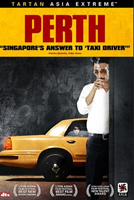
BUY IT AT AMAZON: CLICK HERE!
STUDIO: Tartan Video
MSRP: $22.95
RATED: NR
RUNNING TIME: 111 Minutes
SPECIAL FEATURES:
• Feature Commentary w/ director
• Feature Commentary w/ lead actor
• Deleted scenes w/ optional commentary
• Set design featurette
• Trailers
The Pitch
"It’s
not-really Taxi Driver meets Herman Melville’s Redburn!"
The Humans
Kay Tong
Lim (
The Nuthshell
Harry Lee
was a simple man. He lived by himself, and worked an easy gig as a security
officer at a shipyard. But when the shipyard downsizes him, he’s forced to turn
elsewhere for his bread, and for the money he’s saving away to retire in
time, and serving as a driver for call girls when he can. Too bad for him the
sex industry in
as he was led to believe. This simple man, confronted with a chance for
compassion toward one of the whores, ends up in a complicated slide from hope
to failure, while his beloved
The Lowdown
Sometimes,
I’ve just got to start with an abstract. I’m sorry, but starting way out in the
ether is the only way for me to get my feet firmly on the ground. I’ve got to
ask: why is redemption such a prevalent theme in crime fiction? Is it because
our societies have imparted on us the moral compass that gives us sympathy for
the wrong man trying to make things right? Is it an ingrained sense of
nobility?
It’s not
that I’m concerned about why characters drive toward personal redemption; more
interesting, and more important, is why audiences are so drawn to stories of long
climbs out of the valleys and into the mountaintops. Watching
that’s been buzzing around in my head for a while without really anchoring
itself to proper words: we like redemption because it represents a journey from
complications to simplicity. Redemption brings with it forgiveness, and with
forgiveness comes forgetfulness.
something blessedly easy to live with.
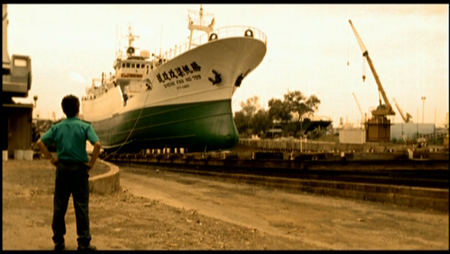
"I ought to be under water."
Coincidentally,
that’s exactly what Harry Lee,
got a good half century behind him, filled with its own share of successes and
failures. The trouble is, the failures seem to weigh more. The film is shot
through with flashbacks to Harry’s time in the military and to periods during
the disintegration of his marriage — both spans that haunt him into an awful
lot of whiskey bottles. Add to that an estranged son who wants nothing to do with
him, and Harry definitely presents a figure whose laid-back declarations of
Perth’s charms strike a tone that the audience hears somewhere between
cowardice and ingratiation.
To reach
his dream, Harry takes simple actions. He starts working for a pimp, driving
girls around. Nothing wrong with the job. He socks away a little money every
check to pay for his one-way ticket to
moving in a single direction with a single purpose. Simple men are vectors; they
have a velocity, and not much else. But where other people, gifted Harry’s
life, might aim for redemption and its pursuant simplification of life, Harry
goes straight for the latter.
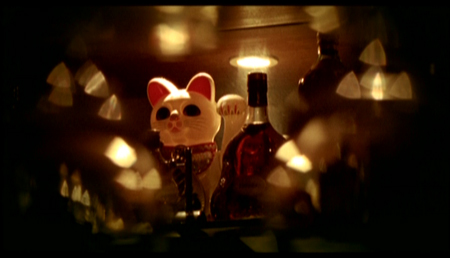
Stop raising your hand. You’ll never be right.
It’s too
bad for Harry that he didn’t take more in the way of physics classes at school.
The world moves with a sort of vector arithmetic; any direction you’re going,
you’re going to be bumped off course, a little or a lot, by other people with
their own cross purposes. Harry winds up driving a young Vietnamese girl, Mei,
around to her various clients. His job is just to get her to the drop off, and
stick around to drive her back to the dormitories. But when Mei crawls back
into the car with vicious bruises on her face and arms, Harry starts to let
himself get more involved.
No man is
an island, and only a few of them get to live on one. Harry loses his tunnel
vision and lets himself care about Mei and her life, sent away from her family
so she can work, and post them money every week to pay off the interest on
their gambling debts. It’s a history that, as is gradually revealed, strikes a
sympathetic chord in Harry. He asks his boss to turn his paycheck over to Mei
every week so she can buy her freedom from the pimp. He’s still doing his
part-time cab service, which gives him enough to live on.
It’s an
arguable noble thing for Harry to do, both for himself and for Mei, but
nobility doesn’t sit right with the world. I’ve written here about a certain
scene in Herman Melville’s novel Redburn before, but it’s worth
bringing up again. The titular protagonist finds himself in a port town in
youth. Wandering an alley, he comes across a woman with her two young children.
They all look as if they’re just at the point of death, from starvation and
disease. Redburn’s moral dilemma comes when he considers bringing them food and
water; would showing a temporary kindness actually give them comfort, or merely
prolong the pain that leads up to their inevitable deaths?
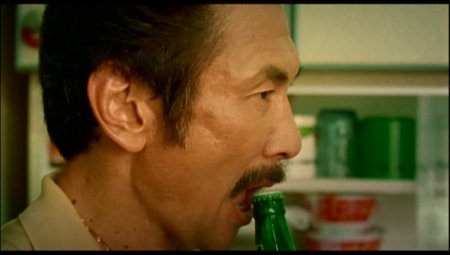
Is it "Fuck you bottle?" or "Fuck you dentures?"
Harry Lee
faces a similar crisis, though with much less awareness than did Redburn. He
thinks he’s doing a great thing, giving Mei the money to buy her freedom. He
doesn’t bother to consider that freedom isn’t what she needs. She needs a
steady job with a paycheck to send to her parents every week. It’s better for
her to remain a whore than to become a free, and untethered, woman.
Complications
set in, as they’d have to after Harry gets himself caught up in a web of
different humans. There’s a moment in which he realizes that his goal has been
simplicity, and that he has lost his aim on redemption; the whole story
balances on that fulcrum moment. It’s a memorable little thing, all messy and
complicated and unresolved.
pacing too laborious, and the acting often hit-or-miss. I mention these things
here in the last paragraph only because they are present, and stand to mitigate
the admiration I have for the story to something resembling a balanced view.
for simplicity in form, but happens into complexity almost by accident. It’s
plenty rewarding, and a fine, if understated, introduction to Singaporean
cinema.
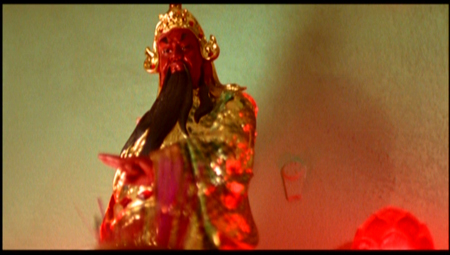
TLC is planning a documentary on this guy. They’re calling it:
"I Can’t Stop Eating Or Possessing Infinite Unity". Tyra Banks will intervene.
The Package
I don’t
hardly need to tell you that Tartan has done well with this release. They are
consistent bad asses when it comes to this stuff. (Except why the unskippable,
poorly-edited intro to the more recent discs, guys?)
sonics and bare melodies, so it doesn’t benefit too much from the DTS track
included, but still, hearing this:
"I’m
no fucking use to anyone / I’m no fucking use at all!" sung drunkenly and
loudly in perfect clarity probably makes the whole thing worthwhile.
The
bonuses include two separate commentary tracks — one with the director, Djinn,
and one with the lead Kay Tong Lim — which overlap in content from
time-to-time, but contain enough personal reflection to keep them distinct
enough to warrant having both present. Djinn is a little more engaging than Kay
Tong Lim, but there’s a sagacity to the actor’s stories that makes his
commentary feel a bit more like a welcome education.
There are
also some deleted scenes with optional commentary by Kay Tong Lim, but, like
you might have come to expect, these do little to actually flesh out the world
of the film they were excised from.
Finally,
there’s a featurette on set design, from construction to dressing. Now you can build your own whorehouse! Ready? Begin.
7.8 out of 10